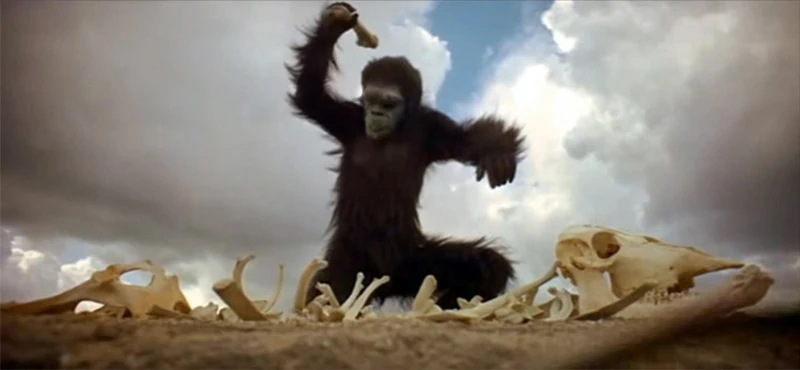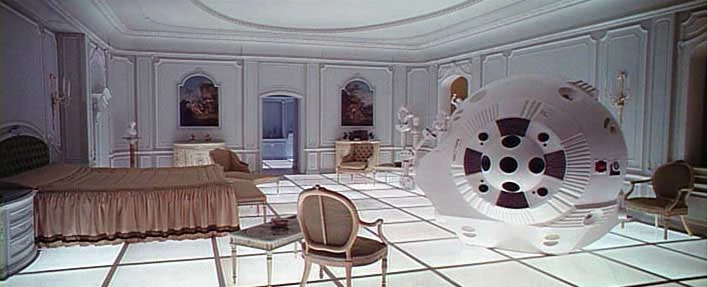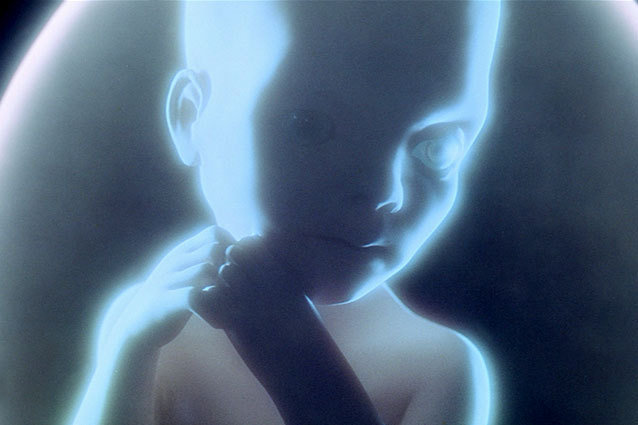A Long Strange Trip
I just read Michael Benson's Space Odyssey about the making of Kubrick's 2001. Benson calls the film a masterpiece, but I don't think I'd go that far. In fact, I think it's rather silly. The way I see it, there's this small, fascinating film about a runaway computer in the middle of an overreaching, pretentious, slow-paced epic.
But the film has become iconic, there's no question about that. In fact, almost every section of the film is famous for one thing or another--a shot, a setting, a line, a musical cue. And the story of how everything got that way is fascinating, for 2001 was not created like any other film.
In 1964, Stanley Kubrick was on top. He'd made a number of well-regarded films, and his latest, Dr. Strangelove, was both critically admired and a hit. He decided he wanted to make a "good" science fiction film. At that point, the genre was not highly thought of, and nothing, not even the big budget films of the 50s, were what Kubrick (or any serious critic) would call good.
So he contacted Arthur C. Clarke, thought to be one of the best, or perhaps the best writer in the field. Clarke had written about how contact with aliens might change humanity. Kubrick optioned a bunch of Clarke stories, but the two decided to come up with something original for their film. And then he made a deal with MGM--the director was a big enough name that the studio agreed to pony up $5 million with not much more than a promise Kubrick would turn out something interesting (and he wasn't to be bothered until he did).
Kubrick had an even weirder idea for the screenplay. Clarke wasn't a screenwriter, so they determined he'd write a novel and they'd base the screenplay on that. Throughout Kubrick's career he based his films on novels, and it probably is easier to create if you've got a property first, but to actually write a novel just so you can base a film on it seems the wrong way to go about it.
They thought the project would take a couple of years from start to finish, but it ended taking up four. And it cost more than twice what MGM originally put up. Clarke was pulling his hair out, since Kubrick wouldn't allow the novel to be released until the film was out (and Clarke needed the cash when the screenwriting money ran out).
Amazingly, even as Kubrick was building his expensive sets, casting his actors and planning to shoot, he and Clarke were still figuring out the story. For instance, what part the computer on the ship would play (it wasn't even called HAL yet) was still being worked out while other things were well underway.
Kubrick also took a chance on a lot of young men who wanted to work on the project, and if they showed promise, he promoted them and gave them more responsibility. Most seemed to know the film was something special, and gave their all.
Shooting went on a long time. And only after all the space scenes were shot did Kubrick work on the "Dawn of Man" sequence. He also spent a long time trying to figure out how he'd picture the aliens until he figured it couldn't be done.
In post-production, he was still wondering if he'd start the film with a short documentary featuring scientists speaking about extra-terrestrial intelligence. And Clarke was still working on the narration. Ultimately, Kubrick decided against any narration. He also cut a lot of dialogue, some before shooting it, some in the editing room. He wanted the film to be a visual experience, and fairly ambiguous. It's quite amazing to realize how close it came to having a spoken voice explaining the plight of the early humans, or why you need a space ship to rotate to simulate gravity, or why HAL the computer was going nuts. (Douglas Rain, who would become the voice of HAL, was originally called in to be the narrator.)
Then came the previews. MGM executives wanted to know what this thing was they'd sunk millions into. It was a disaster. The film was slow, confusing and repetitive. People were walking out. Kubrick and Clarke were both horrified.
Kubrick cut out around 20 minutes. Then it opened. The critics hated it, but the young crowd, looking for a new sort of experience, came out. This crowd may not have been available in 1964, but by the end of the decade, they'd grown up and were watching different kinds of films. 2001 played a long time and was a huge hit. Even the critics eventually came around. (You can't really blame them for their initial reaction. The film doesn't have the conventional Hollywood rewards of acting, plot and dialogue.)
And it's since become one of the most famous films ever made, widely considered a masterpiece, the biggest thing both Clarke and Kubrick were ever attached to. (Clarke's novel finally came out and was a bestseller. It's also good as a guide to the movie, explaining what's going on if you're confused).
While I can't say I love the film, the book's discussion of how it got made certainly gets my thumbs up.






9 Comments:
LAGuy wrote:
In fact, I think it's rather silly. The way I see it, there's this small, fascinating film about a runaway computer in the middle of an overreaching, pretentious, slow-paced epic.
You have given the perfect summary of this vastly overrated movie.
The movie is several movies clipped together. At some points it becomes pedantic hard science-fiction (for example, when the astronaut goes for a space-walk, the camera zooms in on his shoes so you can see they are magnetic. "Look," the director or screenwriter is saying, "we are trying to be scientifically accurate." The cylindrical ship rotated for gravity in which the astronaut can jog is another example.
And then the last 20 minutes are stream-of-consciousness psychedelia.
[In 1968] ... the young crowd, looking for a different sort of experience, came out. This crowd may not have been available in 1964, but by the end of the decade, they'd grown up and were watching different sorts of films.
I agree that 1968 young people had more experience with "modern" films than 1964 young people. But you have omitted the biggest single factor in why the college-aged youth of 1968 loved this movie:
They were stoned.
Clarke's novel finally came out and was a bestseller. It's also good as a guide to the movie, explaining what's going on if you're confused.
That's why I hold that 2001 by itself is a failure, but combined with its sequel 2010 it works quite well. Critics hated 2001 because it wasn't psychedelic. It was careful, rigorous hard SF, and in that way resembled parts of 2001, but the critics had never cared about those parts. (And unlike the hard SF in 2001, the SF in 2010 was not ponderously slow.)
But most importantly, 2010 actually explained 2001 retroactively, as well as making sense itself. Try showing 2001 to ten thousand folks who have never seen the movies nor read the book, and ask them why HAL went crazy, and how that connects to the rest of the movie. They won't know, because there are very few clues. The actual answer fits together perfectly, but it's not explained unless you read the books or watch 2010.
By the way, when I was a kid everyone claimed that "HAL" got his name by taking "IBM" and replacing each letter with the alphabetically preceding letter. Did Benson's book address this claim?
Though the movie was influenced by things going on at IBM, Benson's book claims the HAL-IBM thing was a coincidence. Or perhaps a subconscious connection.
For quite a while the plan was to call the computer "Athena" (which of course has a connection to the original Odyssey).
Open the pod bay doors, HAL
2001 is far-thinking poetry. 2010 is bland, literal clichés, which is why no one remembers it.
HAL= Heuristically programmed ALgorhythmic computer.
Two good words for my 8th grade reading class (which assigned 2001 as an option- very cool for the time)
This comment has been removed by the author.
ALgorithmic I meant
It's like the show Joey starred in on Friends, "Mac and C.H.E.E.S.E."
Joey played detective Mac Machiavelli, and his partner was a Computerized Humanoid Electronically Enhanced Secret Enforcer, aka C.H.E.E.S.E. As Joey noted, quite a lucky break his initials spelled that.
Post a Comment
<< Home